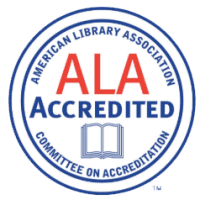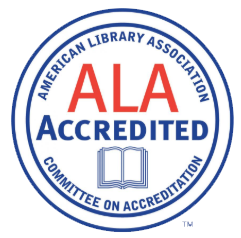Earn Your Master’s Degree in Library and Information Science
With our Master of Library and Information Science, you will gain the skills to connect communities, advance equity, and promote justice. You’ll learn how to discover, manage, and organize information resources while focusing on user services, data privacy, protection, and information literacy.
Your studies will emphasize information justice, equity, engagement, and technology use in your community, allowing you to put your training to work through experiential learning in various settings.
Program Benefits
- Prepare for or advance your career in libraries, museums, schools and other settings.
- Available on campus or online to suit your schedule.
- Accredited by the ALA for nearly 100 years.
- Gain experience and build your resume through hands-on experience
Program Info

Next term starts:
Spring 2026
36
Total Credit Hours

Program Duration:
Complete in as little as one year

Program Delivery:
Available on-campus and online
12
Courses
Admissions Requirements
Scholarships & Awards
How to Apply
Tuition & Fees
Cost per
credit
$2,015
X
Number
of credits
36
=
Total
Tuition
$72,540
*All on-campus students are eligible for generous scholarships, which may help reduce the overall graduate cost.
What Can You Do with a Master’s in Library and Information Science?
A Master’s in Library and Information Science (MLIS) opens doors to a wide range of career opportunities in both traditional and emerging fields. This degree equips you with the skills to manage and organize information, whether in libraries, museums, archives, or other information-driven environments.
Career opportunities
- Archives and special collections librarian
- Competitive intelligence analyst
- Electronic resource librarian
- Information architect
- Information officer
- Librarian and media specialist
- Program consultant
- Publishing manager
- Rare books curator
- Research analyst
- Subject specialist librarian
- Web content strategist
Highly ranked program by
US News & World Report
US News Website
MEDIAN PAY FOR
LIBRARY PROFESSIONALS
Bureau of Labor Statistics
US News & World Report
Ranking in Digital Librarianship
US News Website
Delve Deeper, Explore Farther.
In addition to getting practical, on-the-job experience, students have opportunities to join a research lab or collaborate with faculty on their academic work, exploring the role of information in furthering social justice.


Pursue Your Interests.
Explore topics that interest you most. Our flexible program offers focus areas and the opportunity to solidify your expertise with a Certificate of Advanced Study in Data Science or pursue another professional pathway.


Grow Your Potential.
The iSchool’s tight-knit community, coupled with Orange pride, means that you’ll become part of a vibrant and active professional network when you graduate. That’s how we’re able to place nearly all of our graduates into a variety of roles, from school districts to libraries to universities, to museums, and beyond.
to career support staff




Our LIS program has been accredited by the American Library Association (ALA) since 1928. We currently hold continued accreditation status through 2030.
Courses & Curriculum
The 36-credit LIS curriculum is designed to prepare librarians who have the broad range of knowledge and skills needed for exemplary practice in the library and information profession. Students in the School Media specialization should consult the School Media specific curriculum.
Core Knowledge and Skills: 15 credits
LIS core courses provide a solid grounding in the knowledge, skills, and values of the library and information profession. The 15-credit LIS core has three parts:
Introductory Core: 3 credits
Information Resources Core: 9 credits
Management Core: 3 credits
Electives: 18 credits
The 18 credits of electives allows students to extend their core knowledge and skills in directions of their choice. Students can select any graduate-level course in the iSchool, including those from the MS Information Systems or MS Applied Data Science programs. Up to six credits may be taken from other approved graduate programs.
Exit requirement
IST 773 should be taken in the final term of the MSLIS program. This course is intended to facilitate a holistic, comprehensive, and reflective demonstration of the competencies students have learned in the program by allowing them to reflect on their body of work and make explicit connections among coursework and experience.
Professional Pathways
The MSLIS program strides to cultivate leaders in the library and information profession who will become implementers and advocates for information justice and equity, community engagement, and technology use in their communities of practice. It is designed to prepare library and information professionals with a broad range of knowledge and skills needed for exemplary practice and leadership in the library and information profession.
Student Success Stories
Meet Our Alumni
Our alumni are a shining example of how a solid foundation in information management can transform careers and shape industries.
Explore the stories of these trailblazers who are shaping the future of information access, curation, and preservation.

Library Technology Director Sees Digital Divide as Social Justice Issue
Dr. Dane Dell, G’11, G’17, is director of information systems for the Onondaga County Public Library System and has made it his mission to provide equitable access to information and technology.

Beth Patin
Championing info equity, Beth Patin advances epistemic justice, crisis informatics, & community resilience.

Sebastian Modrow
Linking history to LIS, Sebastian Modrow unites archival critique, info ethics, & heritage work.

Renate Chancellor
Leading LIS for DEIA, Renate Chancellor champions equity, historical justice, & inclusive leadership.
Faculty Experts
At the iSchool, our M.S. in Library and Information Science (LIS) program is guided by a distinguished team of experts who bring a wealth of experience and knowledge to the classroom. Get to know the experts shaping the next generation of library and information studies and how their expertise enriches the student experience:
Frequently Asked Questions
How long does it take to complete the graduate program in library and information science?
With a total of 36 credit hours, the program typically takes about 1-2 years to complete.
Is a degree in library and information science worth it?
Yes, it can be worth it for those passionate about managing information, with a stable job outlook and diverse career options in libraries, archives, and tech.
What career opportunities are available with a degree in library and information science?
Career options include librarians, archivists, information specialists, data managers, and roles in digital asset management, research, and education.
What skills are essential for success in a library and information science program?
Essential skills include critical thinking, research, organization, communication, tech literacy, and knowledge of information systems and ethics.

